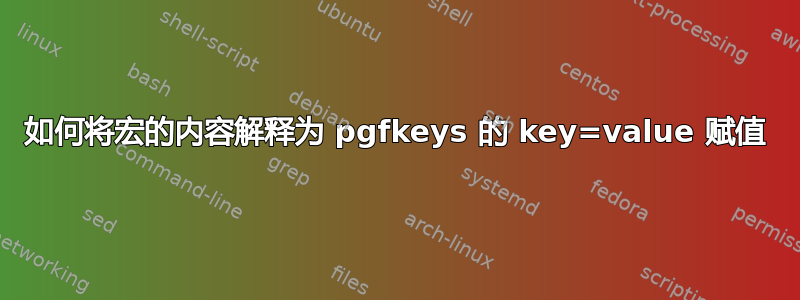
基于这个 pgfkeys 方法,我尝试将选项收集到宏中以供以后重复使用:
% Set options for a photo
% #1 = options, #2 = photo name, i.e. June
\newcommand\SetPhoto[2][]{%
\expandafter\def\csname #2photoOptions\endcsname{#1}%
}
\pgfkeys{
/Photo/.is family, /Photo,
defaults/.style = {bleed = 0pt,},
bleed/.initial = {},
}
% Place the photo using eariler options
% #1 = photo name
\newcommand\DoPhoto[1]{%
\pgfkeys{
/Photo, defaults,
\csname #1photoOptions\endcsname,
}%
% ...
% ... deal with placing the photo, \includegraphics and so on
% ...
}
像这样使用它:
% somewhere early in the document
\SetPhoto[bleed=3mm]{June}
\SetPhoto[bleed=5mm]{July}
% typeset the photos with the given options
\DoPhoto{June}
\DoPhoto{July}
但是 pgfkeys 将宏 ( bleed=3mm) 的整个内容视为键:
! Package pgfkeys Error: I do not know the key '/Photo/bleed=3mm' and I am going to ignore it. Perhaps you misspelled it.
如何将宏的内容解释为键=值赋值?
答案1
您要么必须使用任意\expandafter,\edef组合来扩展定义中的控制序列,要么使用按键来执行所有操作。由于控制序列包含样式按键,因此定义宏毫无意义。相反,请使用按键系统并将选项转储到样式中:
\newcommand*\SetPhoto[2][]{\pgfkeys{/Photo/#2photoOptions/.style={#1}}
然后当你有
\newcommand*\DoPhoto[1]{\pgfkeys{/Photo, defaults,#1photoOptions}}
或此定义的扩展版本。
答案2
根据 percusse 的回答:
\documentclass{article}
\makeatletter
\usepackage{pgfkeys}
\pgfkeys{
/Photo/.is family, /Photo,
defaults/.style = {bleed = 0pt,},
bleed/.initial = {},
}
\newcommand\SetPhoto[2][]{\pgfkeys{/Photo/#2opts/.style={#1}}}
\newcommand\DoPhoto[1]{%
\pgfkeys{/Photo, defaults, #1opts}%
% suppose it was an image...
\hskip -\pgfkeysvalueof{/Photo/bleed}%
\frame{#1}%
}
\setlength{\parskip}{0pt}%
\setlength{\parindent}{0pt}%
\makeatother
\begin{document}
% somewhere early in the document
\SetPhoto{May}%
\SetPhoto[bleed=3mm]{June}%
\SetPhoto[bleed=5mm]{July}%
% typeset the photos with the given options
\DoPhoto{May}
\DoPhoto{June}
\DoPhoto{July}
\end{document}



